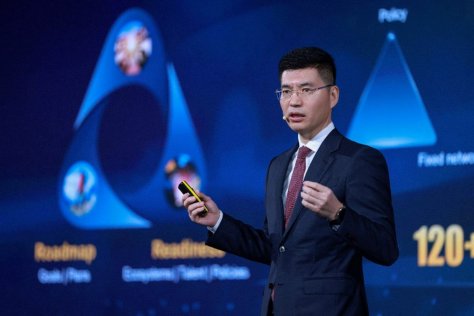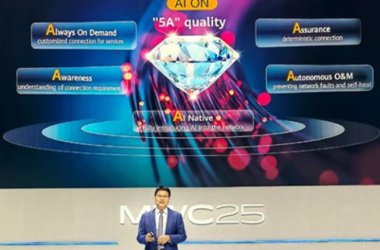
In the ever-evolving digital transformation landscape, global ICT leaders can be champions of industrial digitalisation and intelligence that transforms productivity across sectors.
Indeed, the World Economic Forum estimates that 70% of new value created over the coming decade will be based on digitally-enabled platform business models.
At the Industrial Digital and Intelligent Transformation Summit that took place during GITEX GLOBAL 2024, Huawei unveiled its comprehensive strategy to accelerate industrial digitalisation and intelligence. During his keynote speech at the Summit, Leo Chen, Corporate Senior Vice President and President of Enterprise Sales at Huawei, emphasised that the confluence of AI, 5G-A and other advanced technologies is driving the fourth industrial revolution, heralding a significant leap in productivity. However, this transformation is not without its challenges, particularly in infrastructure, industrial applications, and talent ecosystems.
“First, digital and intelligent infrastructure needs a more solid foundation. Currently, less than 50% of devices are connected and computing is unaffordable, energy-intensive, and in short supply. Meanwhile, the sheer number of industry scenarios and AI hallucinations is keeping AI penetration below 12% while ecosystem, talent, and policy gaps remain big challenges,” Chen added.
Huawei’s full-stack technical capabilities in network, storage, computing, and cloud provide a unique ability to support industries in building this crucial infrastructure. Recognising that high-quality data is the cornerstone of AI inference and computation, Huawei has launched a series of groundbreaking products. These include the industry’s highest-performance Wi-Fi 7, the first 800GE AI router, and the first all-optical data centre switch, setting new benchmarks for real-time, high-speed, and lossless data transmission across campus networks, wide area networks, and data centres.
To complement this robust network infrastructure, Huawei also introduced next-generation, AI-ready, all-flash storage products. These solutions not only increase data storage capacity but also significantly enhance data retrieval and recovery speeds. Furthermore, Huawei has developed two distinct computing solutions: Kunpeng for general-purpose computing and Ascend for AI computing. These open ecosystems, complete with hardware, software, applications, and development toolkits, offer partners and customers greater choice and flexibility in their digital transformation journey.
Recognising the imperative of cloudification in the AI era, the company showcased the Huawei Cloud Stack. This innovative solution allows enterprises to deploy cloud-infrastructure data-centre solutions on-premises, delivering public cloud performance and service experience while meeting stringent data localisation and protection requirements.
Beyond infrastructure, Huawei is committed to guiding industrial customers through their digital transformation, Chen explained. To this end, the company has proposed a 6-layer “reference architecture” designed to provide industries with a blueprint for successful intelligent transformation. This architecture has informed the development of over 200 industry-specific solutions underpinned by four key implementation models.
The comprehensive strategy and solutions offer a roadmap for industries to navigate the complex landscape of digital and intelligent transformation. By combining cutting-edge infrastructure with industry-specific insights and flexible implementation models, Huawei is positioning itself as a key enabler of the fourth industrial revolution, driving productivity and innovation across sectors.
In a bold move to quantify the impact of digital transformation, Huawei has developed a new Global Digital Index (GDI) in partnership with IDC. This index offers customers worldwide quantitative evaluation indicators for transformation, providing a valuable tool for organisations to assess their digital maturity and identify areas for improvement. The GDI is expected to become an industry benchmark, driving more targeted and effective digital transformation strategies.
Looking ahead, the potential applications of advanced technologies in various sectors are vast. In manufacturing, for instance, integrating AI and IoT could lead to predictive maintenance systems that dramatically reduce downtime and optimise production processes. In healthcare, advanced data analytics and 5G connectivity could enable remote surgeries and personalised treatment plans based on real-time patient data. The transportation sector could see the rise of fully autonomous vehicles and smart traffic management systems that significantly reduce congestion and emissions.
As we stand on the cusp of this new era, Huawei’s vision for industrial digitalisation and intelligence offers a glimpse into a future where technology seamlessly integrates with every aspect of business and daily life. By providing the tools, knowledge, and partnerships necessary for this transformation, Huawei can shape the future of productivity. The journey towards a fully digital and intelligent world is well underway, and with Huawei’s innovative solutions and collaborative approach, industries across the globe are poised to make the leap into a more efficient, sustainable, and intelligent future.
Image Credit: Huawei





